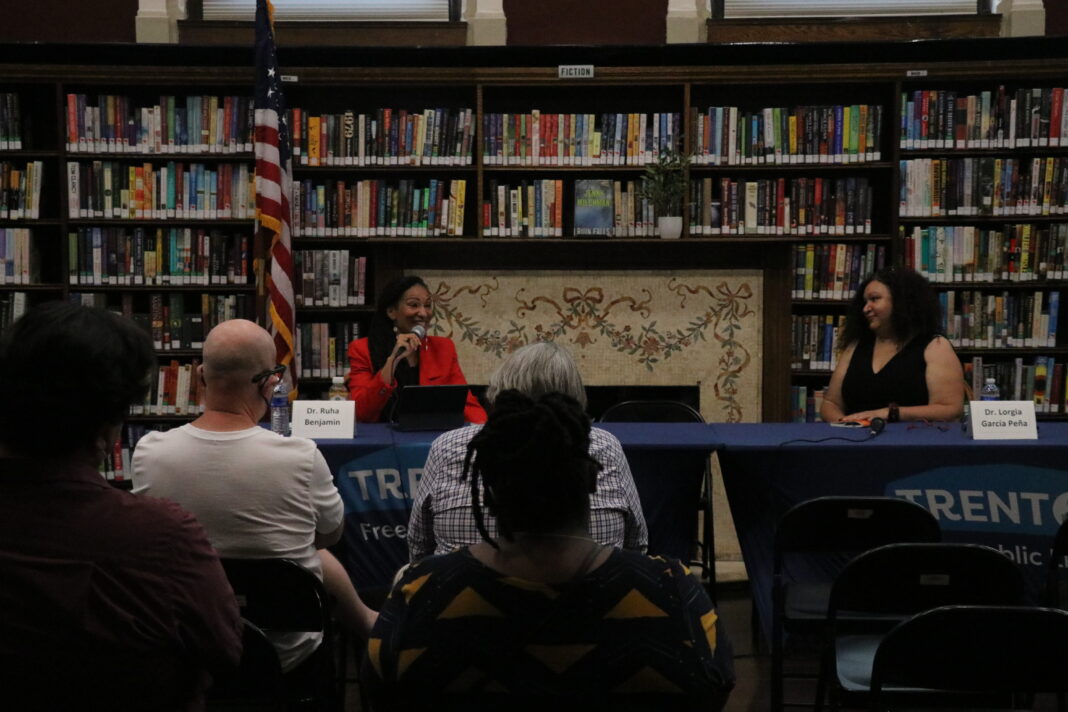There are places children will run to so they can take shelter from the outside world. For published author Lorgia García-Peña, it was the Trenton Free Public Library.
“I immigrated from the Dominican Republic when I was about to turn 13,” said García-Peña, who transferred to Trenton Central High School, ended up in the 11th grade, and finished when she was 15. “I had a strange path where I was much younger, and so I was bullied a lot,” García-Peña said. “I first came into the library to hide.”
There she encountered the wide variety of books the TFPL had to offer. “Coming from the community I came from, I didn’t have access to books. And so very, very soon, this became my home. I was here all the time…it opened my world,” García-Peña said. “This is where I discovered Hemingway and where I discovered a love for literature. People wrote in ways that I’d never experienced before, and it was my first library card. So, it is a very special place for me.”
Decades later, for the first time in her professional career, García-Peña returned to the TFPL to launch her newest book, Community As Rebellion. Published in May 2022, the book is a personal testimonial that weaves in the political analysis of modern-day academia. Throughout the pages, García-Peña invites minority women to examine and break through the academic world of tokenizing and exploitative structures.
In the Reading Room of the TFPL, Trenton residents could listen to García-Peña speak on creating liberatory spaces for students and faculty of color within academia. Dr. Ruha Benjamin, a professor of African American Studies at Princeton University and director of the Ida B. Wells Just Data Lab, led the interview in front of TFPL guests, covering multiple topics during the meeting. One that stuck out to attendee Lisbeth García from Chester was García-Peña’s view on inclusion.
“The thing that really stuck with me… was that we have to rethink how we think about inclusion, and that’s something that we hadn’t thought about before,” García said. In Community As Rebellion, García-Peña talks about how universities are complicit in creating an environment where minority people are included but unable to change the system.
“We, in this country, have been asked or tasked with inclusion and diversity,” García-Peña said. “Recently, that image that I get when hear inclusion is this dinner table with lots and lots of people sitting and you are running out of space, then you give people a corner, and you have got a bench out of the kitchen, and you can’t fit your knees and elbows. I don’t want to be included because inclusion means that there was a project that was made that was not meant for me.”
She continues to explain that minorities serving on boards tend to find themselves alone. “It doesn’t matter what field you are in; you find yourself being the only Latina, black or Asian. You cannot make changes when you are one in a space. It is impossible. It leads to complacency because you have to survive, and you have to make concessions,” García-Peña said.
The discussion touched on many topics in that vein, opening the door for Trenton residents to ask about how they make advancements and strive for a better world.
One way was to start in the classroom by changing the European-centric view and instead explore the history of different cultures. Alba Hernandez Kanig, Treasure of Trenton Puerto Rico and Friends Organization, attended the meeting. She explained that representation for Trenton is essential; that residents need to learn about their history and see people who look like them achieving.
“Having these kinds of conversations and classes about race and culture, ethnicity, retains students in school, and I think the reason is because of representation. If you see someone or learn about people like you, you see that you can be more than what your mind is telling you…It’ll make you say, hey, I’m worth something. I can be whatever I want to be, or I can be this when I grow up because this other person is doing it,” Kanig said.
Overall, one of the main takeaways is that creating community can create change. García-Peña grew up in Trenton.
“I hope they know there’s so much power and beauty in this community. This is the community that made me who I am. I often say my entire family was here. I also hope that little girls that look the way I look, the little girls that come from the communities I come from who have been told that there’s not much future for them outside of, I don’t know, getting married or getting a two-year degree, that they see themselves in my story. And then they look beyond the struggle, and look at what is possible,’ García-Peña said.
To listen to the entire conversation between Dr. García Peña and Dr. Benjamin, click this link: https://www.youtube.com/watch?v=WfUxj7oajZI.





